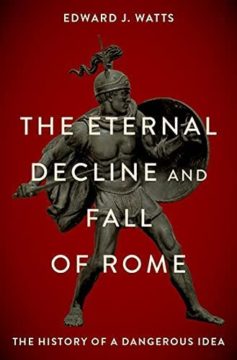Timothy J. Moore in The Common Reader:
 This book is as much a manifesto as a work of history. The manifesto is timely, important, and utterly persuasive. The history is a bit more complicated, but nevertheless offers an eloquent explanation of much that happened in the long history of Rome and its empire.
This book is as much a manifesto as a work of history. The manifesto is timely, important, and utterly persuasive. The history is a bit more complicated, but nevertheless offers an eloquent explanation of much that happened in the long history of Rome and its empire.
Watts follows a long series of modern thinkers in using the history of Rome, especially the end of its empire, to demonstrate an understanding of politics (see Watts’s excellent assessments of Bruni, Biondo, Machiavelli, Montesquieu, and Gibbon [227-233]). Responding explicitly to the rhetoric of decline and renewal used by contemporary conservatives, Watts argues that from the second century BCE through the fall of Constantinople in 1453 CE, and even beyond, Roman rhetoric of decline and restoration caused massive suffering and often brought about the very decline it professed to combat; for the attempts at restoration almost always brought victims, as the alleged restorers blamed others for the alleged decline. In responding to crises and challenges, Watts argues, states need not to seek scapegoats, but rather to “take credit for what we restore as part of a collaborative process that rebuilds and renews, bringing society together rather than tearing it apart through recrimination and violence.”
More here.
